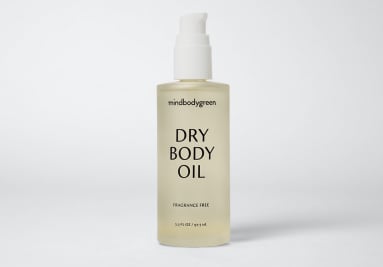Can You Reverse Sun Damage? Look For These Ingredients
Remember: The best way to deal with sun damage is to not get it in the first place.


mbg Beauty Director
mbg Beauty Director
Alexandra Engler is the beauty director at mindbodygreen and host of the beauty podcast Clean Beauty School. Previously, she's held beauty roles at Harper's Bazaar, Marie Claire, SELF, and Cosmopolitan; her byline has appeared in Esquire, Sports Illustrated, and Allure.com.
Image by Ohlamour Studio / Stocksy June 7, 2023 Our editors have independently chosen the products listed on this page. If you purchase something mentioned in this article, we may The best way to deal with sun damage is to not get it in the first place. And to avoid UV damage, we encourage folks to practice smart sun care—which not only involves wearing sunscreen (peep our favorites here), but utilizing accessories and avoiding peak hours when possible. Because, ultimately, sunshine is vital to our overall health so it’s important we figure out how to enjoy it responsibly. One way to bolster your sun protection is to utilize antioxidants that can curb UV-induced free radicals, which ultimately means less collagen degradation, pigmentation issues, and cell damage. 
Advertisement
This ad is displayed using third party content and we do not control its accessibility features.
"While it is not classified as SPF, it does increase the skin's resistance to the sun by a little bit and is an excellent choice as a base layer before sunscreen," board-certified dermatologist Rebecca Marcus, M.D. says about repairing skin from sun damage. Using antioxidant-rich topicals post-sun, too, can help counteract and repair photoaging. Here, three antioxidants to try for your pre- and post-sun care. Safflower seed oil
Safflower seed oil is a botanical oil rich in essential fatty acids and antioxidants, including a very special flavonoid called acacetin. A 2020 study found that safflower seed oil and this compound can reduce damage caused by UVB exposure, specifically stopping damage to collagen.
It works by blocking an enzyme called collagenase-1, which is responsible for collagen loss. Collagen, you might know, is the skin’s primary structural protein. It’s what keeps skin looking firm, lifted, and youthful. With its loss, comes sagging, fine lines and wrinkles. Sun damage is actually the number one cause of premature aging, accounting for up to 80% of visible aging.
Advertisement
This ad is displayed using third party content and we do not control its accessibility features.
Vitamin E and C
This is a classic skin care combo for a reason. Not only do they provide excellent free radical protection, but they’re also vital parts of the collagen synthesis process1. Vitamin C has the ability to “turn on” your body’s collagen production abilities through the fibroblasts, and vitamin E helps C by recharging it. (They’re synergistic vitamins that work together to become more effective.)
They’ve also been studied alongside sunscreen, and have been found to be excellent additions to SPF formulas2. The antioxidants are able to bolster the protective benefits of sunscreen.
CoQ10
Coenzyme Q10 is an antioxidant your body makes naturally. However, with age it makes less-and-less of it. It’s a very important antioxidant because it has several functions in the body. In fact, your cells need CoQ10 to produce energy3, as it's used in the mitochondria, or the "powerhouse" of the cell.
Like other antioxidants, it neutralizes free radicals—but it also protects against lipid peroxidation4, a process by which free radicals damage skin cell membranes. To top it off, CoQ10 protects the membranes of mitochondria and regenerates other antioxidants, like vitamins C and E—both of which are just as important for healthy skin, as we discussed above.
Advertisement
This ad is displayed using third party content and we do not control its accessibility features.
The takeaway
Getting sunshine is vital for our overall health. That’s why we prioritize finding ways to do so responsibly—and caring for the skin in the process. Utilizing antioxidants like the above can help bolster sunscreen protection, and help your skin recover and rejuvenate after the fact.
Advertisement
This ad is displayed using third party content and we do not control its accessibility features.

 Lynk
Lynk 
-v1646695196476.jpg?1148x800)

































